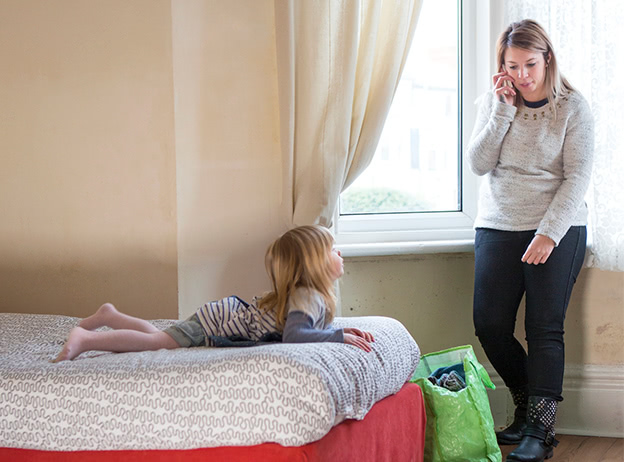
Section
Violence and Abuse
Violence and abuse are serious problems. Young children, even babies, are affected when they see or hear violence. Abuse can be physical, when someone hurts your body. It can also be verbal or emotional, like yelling, cruel words, or a threat. Abuse can happen to men or women. No one, not even a family member, has the right to be violent or abusive. The law protects the rights of anyone who is being abused. Do not be afraid to get help for yourself or your children.
Where to Find Help
24-hour hotlines for reporting child abuse or neglect in each county.
Help with discipline problems and parent stress; child abuse prevention.
1-800-422-4453
Things You Can Do
Protect Yourself and Your Children
In an emergency, call 9-1-1.
If you are scared, talk to the police now. Set aside clothes and money for yourself and your children. You may need to leave in a hurry.
Many areas have shelters where women and children can live safely. The shelter will help you get legal help and make plans for the future. To find a shelter, call the National Domestic Violence Hotline.
If you no longer live with a partner who abused you, you can get a restraining order. This is a legal document that says the person cannot follow or bother you or your children. Contact the National Domestic Violence Hotline to learn more.
Help Prevent Violence and Abuse
Solve problems peacefully at home. Children who see or hear shouting and violence at home are more likely to be depressed and anxious.
Abuse and neglect are more likely to happen when one or more family members are under extreme stress. This can include alcohol or drug problems, a violent relationship, or money problems. If your family is under this kind of pressure, use this guide to find help.
Checklists
Violence and Abuse Checklist
If someone close to you does any of these things, it could be a sign of abuse. Do not blame yourself. It is not your fault. For help, call the National Domestic Violence Hotline.
Abusing or Neglecting a Child Is Against the Law
Abuse includes hitting, yelling, or having sexual contact with a child. Most abuse happens at home, and most abusers are someone the child knows. Teach your children to tell you if they are being harmed or sexually abused. Take it seriously and report it. Call the Child Protective Services number for your county, or call the Childhelp National Child Abuse Hotline.
Neglect means not giving needed care, such as food and shelter, or leaving young children alone. Young children and babies cannot be left alone. Most children are not mature enough to come home to an empty house until they are about 11 or 12 years old. Children under 12 should usually not be left to care for younger children. Even at 12, it depends on how mature they are.
If You Suspect Child Abuse
If you suspect abuse or have questions about abuse and neglect, call the Child Protective Services number for your county, or call the Childhelp National Child Abuse Hotline. Your call is private. If it is an emergency, call 9-1-1.
Signs of possible child abuse include:
Unexplained bruises or marks
Unexplained pain, swelling, or bleeding in the mouth, genitals, or anus
Acting unusually sad, withdrawn, or frightened
Acting unusually violent or aggressive
Copying adult sexual behavior
Trouble sleeping
No interest in school or other activities

Many areas have shelters where women and children can live safely.
About Sexual Assault and Rape
Sexual assault is any sexual activity that you do not agree to, but it is done to you anyway. Rape is one type of sexual assault. If you have been sexually assaulted, do not blame yourself. Get help. Call the National Sexual Assault Hotline or National Teen Dating Abuse Helpline.